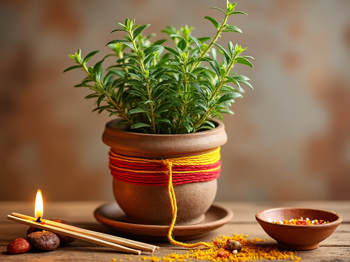



Tulsi Puja is a revered Hindu ritual dedicated to the worship of the Tulsi plant, also known as Holy Basil. Tulsi, considered the earthly manifestation of the goddess Vrinda, is one of the most sacred plants in Hinduism. The ritual is typically performed by devout Hindus in their homes, often daily, and holds special significance during the Hindu month of Kartik, particularly on the day of Tulsi Vivah, which marks the ceremonial marriage of the Tulsi plant to Lord Vishnu or his avatar, Krishna. Tulsi Puja involves offering water, flowers, and incense to the plant, reciting prayers, and seeking blessings for peace, prosperity, and protection.

Symbol of Purity and Devotion: Tulsi is revered as a symbol of purity and devotion. The plant is believed to embody the goddess Vrinda, an incarnation of Goddess Lakshmi, who represents prosperity, virtue, and well-being.
Spiritual Protection: Tulsi Puja is believed to offer spiritual protection against negative energies and evil influences. The presence of a Tulsi plant in the home is thought to ward off illness, sorrow, and misfortune.
Connection to Lord Vishnu: Tulsi is deeply associated with Lord Vishnu, the preserver and protector in the Hindu Trinity. Worshipping Tulsi is akin to worshipping Lord Vishnu, and it is believed that the puja pleases him, ensuring his blessings upon the household.
Environmental and Medicinal Importance: Beyond its religious significance, the Tulsi plant is valued for its medicinal properties. It is known for purifying the air, promoting health, and enhancing the overall environment of the home.
Promotes Mental Peace: Regular Tulsi Puja is believed to bring mental peace and calmness, reducing stress and anxiety.
Enhances Spiritual Growth: Engaging in Tulsi Puja fosters spiritual growth, deepening one’s connection with the divine and nurturing a sense of devotion.
Brings Prosperity: The worship of Tulsi is said to attract wealth, prosperity, and abundance into the home.
Purifies the Environment: Tulsi plants are known for their ability to purify the air by absorbing pollutants and releasing oxygen, thereby creating a healthier living environment.
Protects Against Illness: The medicinal properties of Tulsi, especially its antibacterial and antiviral qualities, contribute to the physical well-being of those who regularly interact with and consume its leaves.
Enhances Relationships: Tulsi Puja is believed to foster harmony in relationships, particularly in marital life, due to the plant’s association with fidelity and love.
Attracts Positive Energy: Performing Tulsi Puja is thought to attract positive energy, ensuring the flow of good fortune and happiness into the household.
Performing Tulsi Puja is a simple yet sacred ritual that can be done daily or on special occasions like Tulsi Vivah. Here’s a step-by-step guide to conducting the puja:
By following these steps, you can perform Tulsi Puja with devotion and reverence, inviting positivity, health, and prosperity into your home.